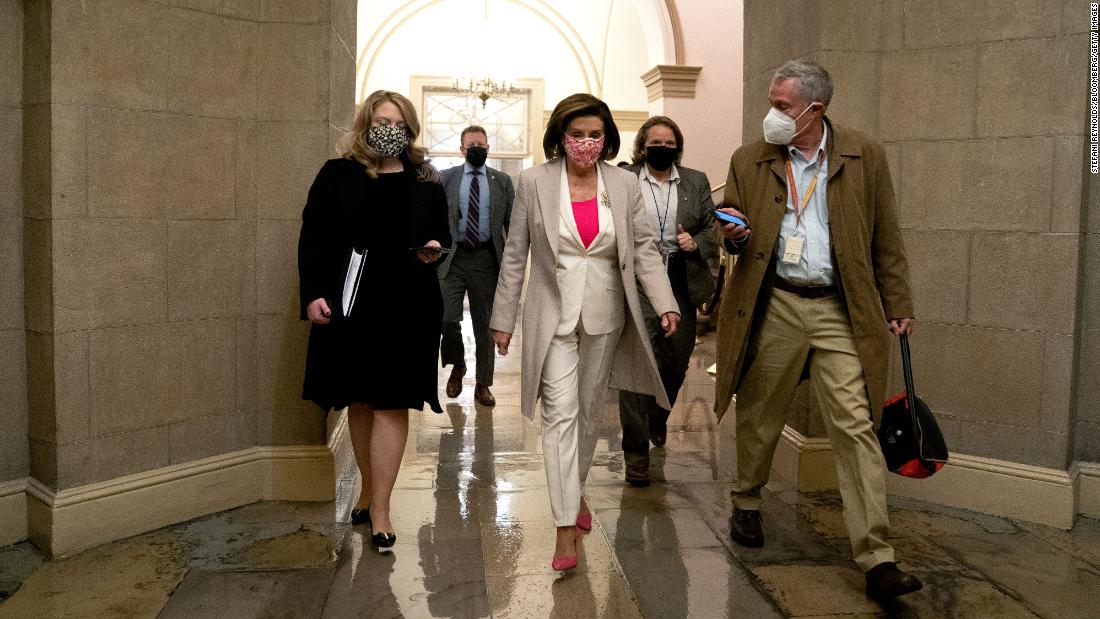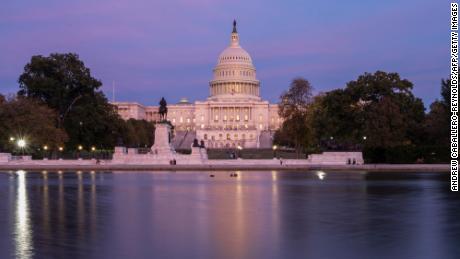The final tally was 220 to 213. Rep. Jared Golden of Maine was the only Democrat to vote against the bill and no Republicans voted for it.
The sweeping economic legislation stands as a key pillar of Biden’s domestic agenda. It would deliver on longstanding Democratic priorities by dramatically expanding social services for Americans, working to mitigate the climate crisis, increasing access to health care and delivering aid to families and children.
House Speaker Nancy Pelosi celebrated the legislation’s passage after the vote. “This bill is monumental. It’s historic, it’s transformative, it’s bigger than anything we’ve ever done,” she said at a press conference.
But Democrats face a major challenge now that the bill has been approved by the House and must be taken up by the Senate, an effort that will put party unity to the ultimate test.
Senate Democrats have no margin of error to approve the legislation and key lawmakers — most prominently moderate West Virginia Sen. Joe Manchin — have expressed concerns over elements of the plan as policy fights loom on the horizon.
What’s in the bill
The social safety net expansion plan, known as the Build Back Better Act, represents a central part of Biden’s policy agenda and an attempt by congressional Democrats to enact a major expansion of the social safety net.
The Build Back Better Act is an effort by Democrats to build on that investment in traditional infrastructure by making extensive investments to ramp up social programs and address the climate crisis.
Among its many provisions, the legislation would create a universal pre-K program, extend the enhanced child tax credit and expand access to health care, affordable housing and home care for seniors.
Democrats argue that the provisions in the bill are urgently needed and will widely benefit Americans. Republicans, meanwhile, have decried the legislation as a reckless and partisan tax and spending spree.
The Congressional Budget Office released its final scoring for the bill early Thursday evening, estimating that the package “would result in a net increase in the deficit totaling $367 billion,” according to a summary.
But the White House has worked to make the case that the bill will be fully paid for, despite the CBO analysis showing a shortfall.
The CBO analysis does not include revenue from tighter IRS enforcement. The CBO estimated earlier that would raise $207 billion.
The White House argues that increased IRS enforcement would actually raise more than what the CBO projects, meaning the bill would be fully paid for in their estimate.
Tough road ahead in the Senate
The legislation is expected to undergo major revisions in the Senate as Democrats who have expressed concerns over aspects of the package are likely to demand significant changes.
That would then require the House to vote again — on a final version of the legislation — in the coming weeks before it goes to Biden’s desk.
Senate Democrats need all 50 members of their caucus to support the bill in order to pass it under a budget process they are using to advance the measure without GOP votes known as reconciliation. That makes the task for Democrats particularly difficult since it means there can be no defections and passage will require total unity.
In an early sign of the impending efforts to change the bill, Sen. Bernie Sanders of Vermont, an independent who caucuses with Democrats, said in a statement after the House vote that the Senate will “strengthen” the bill.
“I applaud Democrats in the House of Representatives for uniting to pass the Build Back Better Act. The Senate has an opportunity to make this a truly historic piece of legislation. We will listen to the demands of the American people and strengthen the bill,” Sanders tweeted.
Senate Majority Leader Chuck Schumer said in a statement after the House vote that the Senate “will act as quickly as possible” to take up the legislation.
Pelosi downplayed the potential for significant changes to the legislation in the Senate.
“Ninety-some percent of the bill was written together, House, Senate, White House. There were some differences at the end, and we’ll deal with those as we go forward,” Pelosi said at a press conference after the House vote.
“We’ll see where we need to, shall we say, reconcile our differences, but at the end of the day we will have a great bill,” she said.
Democrats pass bill after McCarthy’s marathon speech
Democrats have an extremely slim majority in the House and can only afford to lose three votes and still pass legislation. House Majority Leader Steny Hoyer told CNN ahead of the vote that he only knew of one expected Democratic defection, which was Golden.
The House vote Friday morning came after McCarthy stalled floor action with a speech railing against Democrats that stretched into the early hours of Friday morning.
Hoyer announced shortly after midnight that the vote, which had been expected as soon as Thursday evening, would be postponed until later Friday.
“He wants to do it in the dead of night,” Hoyer said, referring to McCarthy. “We are going to do it in the day.”
This story and headline have been updated with additional developments Friday.
CNN’s Manu Raju, Ali Zaslav and Sam Fossum contributed to this report.







